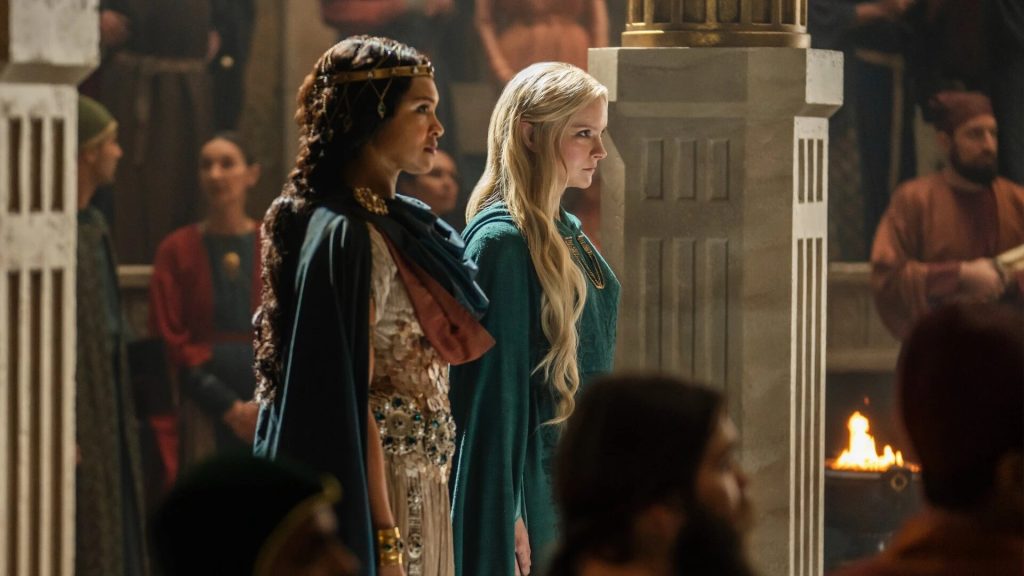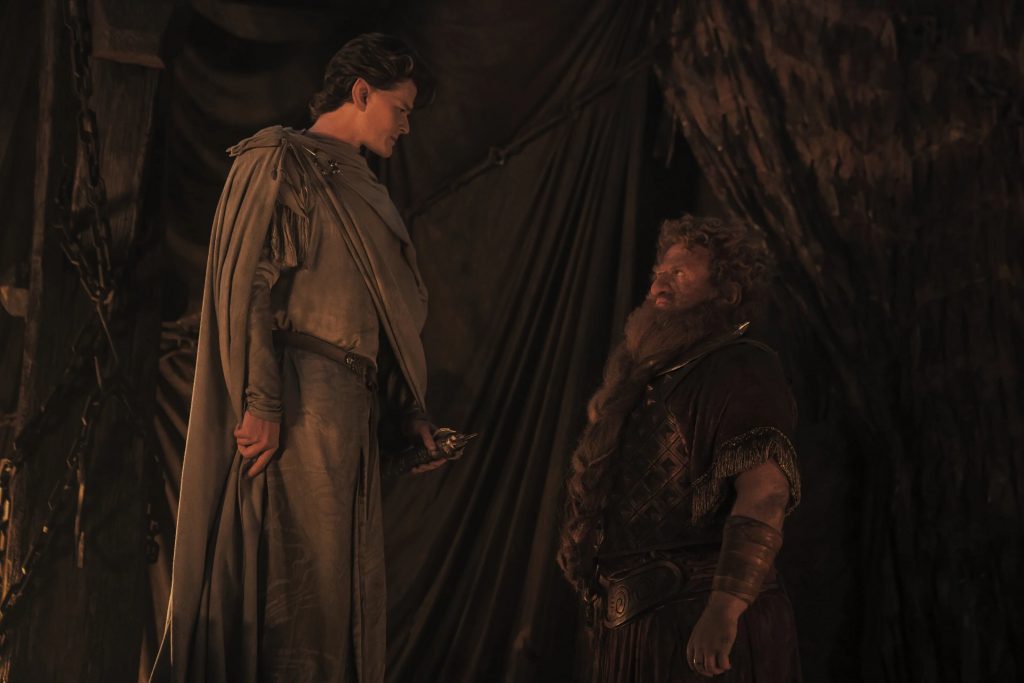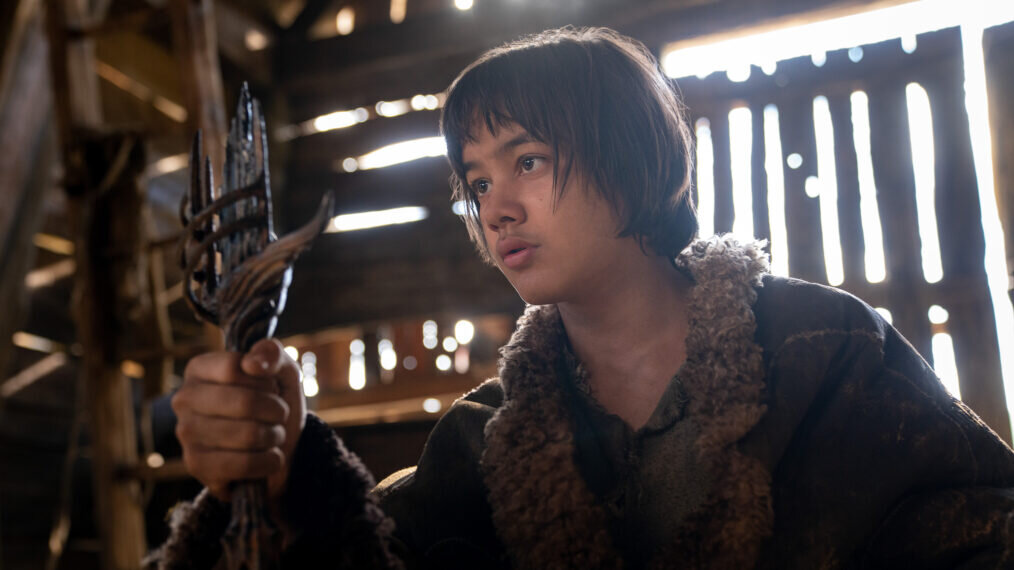Warning: Minor Spoilers Ahead!
Now that we’ve finally trudged to the mid-season episode of Amazon’s expensive Tolkien rip-off, Lord of the Rings: Rings of Power seems to be cautiously finding its footing. “The Great Wave” is the show’s strongest episode to date, offering moments of stunning cinematography and glimpses of entertaining storytelling. However, the fact that the writing in Rings of Power remains wildly inconsistent makes for an uneven and oftentimes derivative watching experience, undercutting any potential the show may have of elevating itself beyond its contemporaries.
A haunting vision of a rising sea engulfing Númenor opens the episode in a beautifully evocative way. Queen Regent Míriel’s anxiety is palpable as she scrambles to save her kingdom from its impending doom while remaining a poised and collected leader in the face of Númenor’s rising political tensions. Míriel’s imposing, prideful, yet dutiful character— wonderfully rendered by Cynthia Addai-Robinson— stands out as one of the rare formidable presences of the entire show. Sadly, the entire Númenorian storyline is bogged down by its many lesser protagonists. The main culprits include Elendil’s son Isildur—who is careless, aimless, and impossible to root for —and his daughter Eärien—whose purpose in the show remains purely ornamental.

But of course, even their characterizations are acceptable compared to the supposedly mighty and wise Galadriel of the Golden House of Finarfin, who continues to display the stubbornness of a teenager and the tact of a bull. Rings of Power’s bastardization of this legendary character almost single-handedly embodies the show’s most glaring and embarrassing writing flaws. Even within this story’s own internal lore, Galadriel’s characterization as a seasoned and influential political player is completely incongruous with her constant immaturity and frustrating lack of self-awareness. Instead of respecting her strength or admiring her determination, I — much like her human companion Halbrand—grow weary every time she comes into frame because I am already dreading whatever self-entitled nonsense she’s about to spew out, which might further put herself in danger.
Fortunately, this episode also periodically brings some glad tidings. This time, we are spared the wishy-washy Harfoot storyline, and are blessed with many more scenes of the Dwarves in Khazad-dûm. The interactions between Elrond, Durin, and Disa still prove to be some of the most memorable scenes and strike me as the most authentic to Tolkien’s writings. When Durin is vexed by the idea of confronting his father after a mining mishap, Elrond comforts Durin and encourages his friend to cherish the time he has left with the king. He ruminates about the conversations he wishes he could have with his late father, Eärendil the Mariner, and whether his life’s work can ever measure up to his father’s legacy. Themes of friendship, love, family, and duty permeate many of Elrond and Durin’s scenes, and this rueful optimism is quintessentially Tolkienian. This is so far the only scene in Rings of Power which has left me— for a brief moment— genuinely moved.

Even the storyline involving the Southlanders (which I was feeling particularly cynical about in earlier episodes) teases some compelling character development as Theo— Browyn’s difficult teenage son— becomes more and more attached to a strange sword hilt that once belonged to Sauron, a bold plot point that has me surprisingly intrigued. Many of Tolkien’s stories (and their adaptations by extension) squarely portray its heroes’ perspectives, leaving little moral ambiguity for those who become corrupted by Sauron— an omission that showrunners ought to take advantage of, especially considering that such a complex arc would bring much-needed nuance to the already-existing plotlines and can be comfortably developed across many seasons. Theo’s transformation from a naive boy to a formidable, loyal servant of Sauron could be the basis for a fascinating and rarely-seen character arc.
And that is what Rings of Power desperately needs, something unique it can call its own— something to make it stand out among the usual fantasy fare consumers are now spoiled with on a regular basis. The showrunners have obviously long abandoned any ideas about remaining faithful to their sources, but so far the story arcs have all followed rather generic formulas. Despite awe-inspiring visuals and a talented cast, Rings of Power’s few shining moments are continuously stunted by writing inconsistencies. The series as a whole has no distinctive essence— a truly bad omen for the show’s future, unless there is great upheaval in season one’s final episodes.

Feel free to let us know your thoughts on the latest episode of Rings of Power! Look out for weekly coverage of upcoming episodes.
